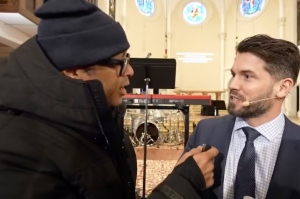A generation poisoned by porn speaks

Not long ago, most non-Christians treated pornography as a harmless expression of sexual freedom. For half a century, Hugh Hefner’s Playboy philosophy dominated, teaching people to wink at porn use. Children discovering a relative’s “stash” became a popular trope in TV and film and was played off for laughs.
In the digital age, distribution and access became easier and instant, and the content grew darker. Finally, more people are admitting that, though it was never harmless, this content now poses a life-altering danger to those who stumble across it — especially children.
In 2021, singer-songwriter Billie Eilish confessed to being one of those children harmed by pornography. In an interview, Eilish described her first encounter at age 11: “I think it really destroyed my brain and I feel incredibly devastated that I was exposed to so much porn,” she said. The things she saw on screen gave her nightmares and led to her “not saying no” to things she should have refused in her own relationships.
Eilish was hardly a voice crying in the wilderness. In the wake of our collective reckoning with abuse and addiction, it has become clear that most children are introduced to sex through pornography, and the porn they’re encountering is like nothing previous generations knew. Even if you don’t count what is being forced on them in elementary school classrooms, what they are being exposed to is extreme, degrading, and, in many cases, criminal.
For example, mainstream, left-leaning publications such as The Atlantic and The New York Times have recently featured essays grappling with the explosion of online pornography featuring children, and how devilishly difficult it is to separate this illegal content from what many view as the acceptable, consensual kind. Those who still attempt to tame or domesticate pornography need to wake up to the devastation it has inflicted on kids and teens. A good start would be to listen to what children and teens have to say about it.
Recently, theater director Abbey Wright at The Guardian, wrote about her project discussing this topic with 10,000 children and young adults. These kids, some as young as six, described a reality nothing like that one scene in “Home Alone.”
“I was exposed to porn before I’d had a proper sexual experience,” one young man said. “[I]t is like a self-fulfilling prophecy. You see something, and you re-enact it. That’s what I like because that’s what I did. That’s what I did because that’s what I saw.”
The average age at which kids are first exposed to pornography is now 12, and there are plenty of outliers. According to Wright, parents can be naïve about this fact: “Whenever I mention to the parent of a child that age that many 6-year-olds have seen pornography, they say: ‘Oh, my child hasn’t.’” In what might be the most haunting line of the article, one teenager simply scoffed at that assumption: “If you put a phone in a child’s hand, you are putting porn in a child’s hand.”
Girls and young women described how warped their expectations and the expectations of boys about what’s normal in a relationship are because of this content. “Young women told us about the pressure they felt from pornography … ‘These porn women do it, so why won’t you?’”
A young man from London summed it up this way, “I think pornography is a bit soul-sucking. … People can’t do anything else. I don’t want to get to a point where I feel like I’m not me any more.”
“Destroyed my brain,” “soul-sucking,” “I’m not me any more.” Are we listening?
Porn in any form is a radical distortion of God’s design for human relationships, especially in how we are to treat each other. It’s an attempt to force the transcendent into an immanent box and to pretend that something God intended as meaningful can be made meaningless.
It cannot. Any time something sacred is mocked and the image of God in all involved is denied, there will be victims. Now, a generation of young people are voicing sorrow and regret because of what we defended as “freedom” and “harmless fun.”
This was true when Hefner mainstreamed porn in the 1950s. It is even more true today. The internet and smartphones have merely cultivated this hideousness for what it is. We must keep unsupervised devices out of unsupervised young hands. Do it.
As a society, we must end this systematic assault on young eyes. Now that so many seem to be finally “getting it,” maybe the opportunity is here. To learn how you can join that cause, check out the terrific work of the National Center on Sexual Exploitation.
Originally published at BreakPoint.
John Stonestreet serves as president of the Colson Center for Christian Worldview. He’s a sought-after author and speaker on areas of faith and culture, theology, worldview, education and apologetics.
Shane Morris is a senior writer at the Colson Center, where he has been the resident Calvinist and millennial, home-school grad since 2010, and an intern under Chuck Colson. He writes BreakPoint commentaries and columns. Shane has also written for The Federalist, The Christian Post, and Summit Ministries, and he blogs regularly for Patheos Evangelical as Troubler of Israel.



























